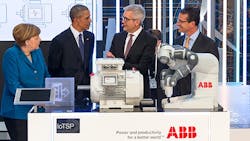The growing presence of the Internet of Things provides manufacturing with a technological marvel but as Greg Scheu, president of the Americas region for ABB, told IndustryWeek at Hannover Messe, “Technology for technology’s sake isn’t usually what creates value.”
In thousands of conversations at the giant industry fair last week in Hannover, Germany, IoT technologies were demonstrated and discussed but perhaps the most important conversations centered on how this increasingly connected world actually helps a business. And for many manufacturers, determining the ROI of this enhanced technology and when to jump in remains less than crystal clear.
ABB’s concept of the Internet of Things, Services and People (IoTSP) is designed to incorporate the capabilities of this emerging technology into how businesses make decisions about their operations and find new business opportunities.
“Things connect today and there will be more of that. But now you look at what you can learn, what services that drives and then how people make decisions and actually drive outcomes,” says Scheu, an electrical engineer by training who joined ABB in 2001. ABB operates its power and automation businesses in more than 100 countries and has approximately 135,000 employees.
ABB is an old hand at providing industry connectivity, Scheu pointed out, with over 35,000 connected systems operating in oil, gas, chemicals and other industries. He said this deep understanding of customers will be especially valuable as companies determine how to implement IoT.
“It will vary by industry and even by customer how they want to take advantage of this,” says Scheu. “That’s where you have to be closer to the customer than ever before.”
For example, Scheu pointed to the proliferation of robots in industry. A robot may have sensors that indicate that its arm is doing its job but not moving as originally intended. For a sophisticated customer such as an auto company, this data will alert them to send an in-house maintenance team to check it out. But for a smaller manufacturer, it may make sense for ABB to remotely monitor that data, notify the customer of an issue and send in a maintenance team to work on the robot’s arm before production is interrupted.
Scheu likens this use of data to determine “asset health” to that of a doctor assessing symptoms and prescribing an appropriate course of action.
“We plot the condition, like a doctor, to how critical is that asset or how critical is the problem,” Scheu explains. “You are making these trade-off decisions around probability and risk. By doing this, you are finding the hotspots and determining how serious a problem is.” Some issues may be the equivalent of a cold – get some rest. Others are more akin to a high fever, where a more serious intervention is needed. By using data and diagnostics, says Scheu, companies can use their maintenance teams more efficiently, focusing on more serious issues rather than operating simply from a pre-determined schedule.
IoT is bringing efficiency not just to workforce deployment but to how factories operate. For example, Scheu cited some estimates that there are 300 million industrial motors operating globally. These motors consume two-thirds of the energy consumed by industry. At Hannover Messe, ABB debuted a smart sensor that can be packaged with new electric motors or retrofitted to existing equipment. The sensor, about the size of a smartphone, can provide operational information such as temperature, vibration and magnetic fields, and monitor energy consumption.
“If the energy consumption is low and the temperature is high, the motor is having problems,” Scheu offers as an example. The customer can use this data or ABB can provide a monitoring service, comparing real-time data to the digital models in its database of how the motor should be operating. Acting on this data, he says, provides an opportunity both to save energy and to prevent a production or power outage. “This is the equivalent of someone having a Fitbit on their arm,” Scheu says.
ABB CEO Ulrich Spiesshofer notes that the sensor, which cost less than $50, "reduces the downtime of motors by up to 70%, extends their life span by up to 30%, and cuts energy consumption by as much as 10%. If all industrial electric motors worldwide were equipped with our smart sensors, the energy savings would be equivalent to the output of 100 large power plants."
While it’s too early to tell how this smart sensor will do for ABB, the product certainly got off to a high-profile start when President Obama examined it during his tour of Hannover Messe with German Chancellor Angela Merkel. The U.S. Environmentalist-in-Chief was impressed with the sensor's potential to help in the fight against climate change.
About the Author
Steve Minter
Steve Minter, Executive Editor
Focus: Leadership, Global Economy, Energy
Call: 216-931-9281
Follow on Twitter: @SgMinterIW
An award-winning editor, Executive Editor Steve Minter covers leadership, global economic and trade issues and energy, tackling subject matter ranging from CEO profiles and leadership theories to economic trends and energy policy. As well, he supervises content development for editorial products including the magazine, IndustryWeek.com, research and information products, and conferences.
Before joining the IW staff, Steve was publisher and editorial director of Penton Media’s EHS Today, where he was instrumental in the development of the Champions of Safety and America’s Safest Companies recognition programs.
Steve received his B.A. in English from Oberlin College. He is married and has two adult children.
